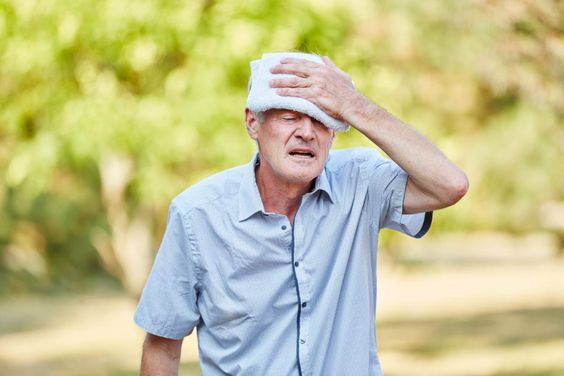Introduction:
Heat exhaustion is a heat-related illness that can occur after exposure to high temperatures, especially when combined with high humidity and strenuous physical activity. It's one of the three heat-related syndromes, with heat cramps being the mildest and heatstroke being the most severe. Recognizing the symptoms of heat exhaustion and knowing how to respond can make a significant difference in preventing the condition from escalating into a more serious medical emergency.

The condition develops when the body, overwhelmed by heat, struggles to cool itself effectively. This can lead to a range of uncomfortable and potentially dangerous symptoms. While anyone can experience heat exhaustion, certain groups such as the elderly, young children, and individuals with chronic illnesses are more susceptible. Understanding the causes, symptoms, and preventative measures can help individuals enjoy outdoor activities while minimizing the risk of heat exhaustion.
Recognizing the Signs of Heat Exhaustion
Recognizing the early signs of heat exhaustion is vital for timely intervention and prevention of more serious heat-related illnesses. Common symptoms include:
- Heavy sweating: The body tries to cool itself down.
- Pale, clammy skin: Reduced blood flow to the skin.
- Muscle cramps: Electrolyte imbalance due to sweating.
- Tiredness or weakness: The body's response to overheating.
- Headache: Dehydration and heat affecting the brain.
- Dizziness or fainting: Reduced blood flow to the brain.
- Nausea or vomiting: The body's response to stress.
- Rapid, weak pulse: The heart works harder to cool the body.
First Aid for Heat Exhaustion
If you suspect someone is experiencing heat exhaustion, it’s crucial to act quickly:
- Move to a cool place: Find shade or an air-conditioned environment.
- Lie down and loosen clothing: Encourage relaxation and improve circulation.
- Apply cool, wet cloths: Place on the forehead, neck, and armpits.
- Sip cool water or sports drinks: Replenish fluids and electrolytes.
- Monitor their condition: Seek medical attention if symptoms worsen or persist.
Preventing Heat Exhaustion
Prevention is always better than cure. Follow these tips to minimize your risk:
- Hydrate consistently: Drink plenty of water, especially during physical activity.
- Avoid strenuous activity during peak heat: Opt for cooler times of day.
- Wear lightweight, light-colored clothing: Promotes airflow and reflects heat.
- Take breaks in shaded areas: Allow your body to cool down regularly.
- Never leave children or pets unattended in vehicles: Temperatures inside a parked car can become dangerously high.
Remember, heat exhaustion is preventable. By taking necessary precautions and knowing how to respond appropriately, you can enjoy outdoor activities safely even during the hottest months.

.jpg)